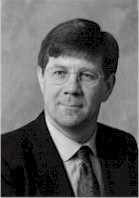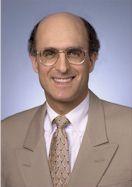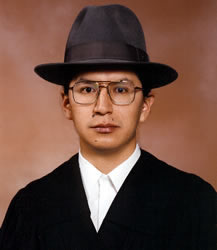|

Luce Faculty Seminar 2001
The
Science of Alternative Medicine
February 26 - April 16
|
|
MICHAEL W. SMITH, M.D.
Herbal Medications in
Psychiatry
Monday, February 26
Herbal medications have been used for the
treatment of illness for thousands of years. Herbal medication has
been identified at Neanderthal archeological sites as well as homo sapien
sites in Egypt, Mesopotamia, Mesoamerica, and China. The first
“Physicians Desk Reference” was compiled by a Chinese emperor more
than 5,000 years ago, and contained instructions on how to select,
prepare, and administer thousands of herbal remedies, for a number of
ailments including mental illness. In addition to the treatment of
mental illness, two of these herbs (rauwolfia and ololiuqui) also played a
significant part in the development of the dopamine and serotonin theories
of schizophrenia. Many cultures continue to rely upon these
medications for their health needs. More recently, Americans have
rediscovered and are using these alternative treatments, including herbal
medications as either a sole or concurrent treatment in increasing
numbers. This trend is of special concern for several reasons,
including the lack of testing and monitoring of the toxic potential of
these agents, especially in combination with other medications, as well as
a general lack of knowledge about their effectiveness in the treatment of
certain disorders. As providers of mental health care, it is
essential that we understand the beneficial and toxic qualities of these
preparations. In this lecture we will discuss the epidemiology,
therapeutic and toxic properties of these herbal medications, with a
special focus on Gingko, Kava, St. Johns Wort, and Valerian.
Dr. Michael Smith is Associate Professor of
Psychiatry at UCLA, and psychiatrist at Harbor UCLA Medical Center.
His current research is in cultural psychiatry at the Research Center on
the Psychobiology of Ethnicity in Torrance, California.
Location: Pickford Auditorium, Bauer
Center, Claremont McKenna
Time: Public lecture 5:00 - 6:00 PM
Dinner-discussion: 6:30 - 7:30 PM (limited to registered faculty members)
References:
 | Wong, A, Smith, M, and Boon, H.
Herbal Remedies in Psychiatric Practice. Arch Gen
Psychiatry, 1998;55: 1033-1044. |
Abstract available
Medline
|
|

|
ADRIAN FURNHAM, D.Phil., D.Sc., D.Litt.
Why do People Choose
CAM?
Monday, March 19
This presentation will consider various medical,
psychological and sociological explanations for why people seek out and
pay for a variety of complementary and alternative medicines (CAM)
treatments despite the lack of evidence that they are effective. It
will consider the biomedical, complementary, progressive and postmodern
perspective on CAM. It will start by considering how modern orthodox
medicine has and has not adapted to consumer changes and demands. It will
then consider how patients, doctors and medical students see various
specialities in CAM. Finally the results of various cross-sectional
studies will be reported which examines how the beliefs, behaviours,
expectations and values of CAM patients differ from those (equivalent
samples) who consult their general practitioner. Implications for
both research and practice are considered.
Dr. Furnham is Professor of Psychology in the
University College London. He has been cited as one of the most
productive European psychologist in the 1990's and second most productive
psychologist in the world, 1985-1995. Author of 30 books including
Complementary Medicine, Culture Shock, The Economic Mind, The Protestant
Work Ethic, Psychology of Money, Personality at Work among others.
Professor Furnham authored 400 peer-reviewed scientific papers in
international scientific journals, and contributed various popular pieces
in newspapers. He is an outstanding academician, consultant on
organizational behaviour, writer and broadcaster.
Location: Edwards Auditorium,
Galileo Hall, Harvey Mudd College
Time: Public lecture 5:00 - 6:00 PM
Dinner-discussion: 6:30 - 7:30 PM (limited to registered faculty members)
References:
 |
Vincent C and Furnham A. Complementary
Medicine: A Research perspective. Chinchester: Wiley, 1997. |
 |
Furnham, A and Vincent C. The
Psychology of the use of CAM. In Kelner et al (Eds) The Challenge of
CAM. London: Harwood, 2000, pp 61-78. |
|
|
|
THOMAS J. KIRESUK, Ph.D.
Overview of
Alternative Medicine Research
in the Treatment of Addictions
Monday, March 26
The goal of this presentation is to provide basic
information for a) researchers and practitioners unfamiliar with CAM for
the treatment of
substance abuse, b) clinicians so they may answer
questions of patients who are using or interested in using CAM therapies,
and c) clinicians considering treatment alternatives for patients who have
special needs and for whom traditional therapies have been ineffective or
unacceptable. To this end, a review will be made of several of the most
frequently utilized or promising therapies such as acupuncture,
biofeedback, and nutrition. For each modality, a brief description will be
followed by a summary of the current state of science. Some of the primary
debates and questions facing both researchers and practitioners will be
presented.
Dr. Kiresuk is Professor of Health Psychology at the
University of Minnesota Medical School; Director of the Center for
Addiction and Alternative Medicine Research; Chief Clinical Psychologist
of the Hennepin County Medical Center; Director of the Program Evaluation
Resource Center, Minneapolis Medical Research Foundation. He has had
experience in a wide variety of human service program and treatment
evaluation including medical, mental health, and substance abuse,
penitentiary medicine, services to victims of personal violence, and
federally funded University/Industry Centers. He is probably best known
for his work in the development of individualized treatment outcome
measurement. Dr. Kiresuk has been Principal Investigator and Evaluator on
twenty-one national grants and contracts, and twenty-three state and
county evaluation research projects.
Location: Avery Auditorium, Pitzer College
Time: Public lecture 5:00 - 6:00 PM
Dinner-discussion: 6:30 - 7:30 PM (limited to registered faculty members)
References:
 |
Kiresuk, T. J. & Trachtenberg A. Alternative and
Complementary Health Practices. In H. I. Kaplan, & B. J. Sadock
(Eds.), Comprehensive
Textbook of Psychiatry/VII. New York: Williams
& Wilkins, 1999.
|
 |
Boucher TA, Kiresuk TJ, Trachtenberg A. Alternative
Therapies. In Allan Graham and Terry Schultz (Eds)., Principles of
Addiction Medicine, 2nd edition. American Society of Addiction
Medicine, 1998. |
|
| 
|
ROBERT H. SCHNEIDER, M.D.
Prevention and
Treatment of Cardiovascular Disease with Maharishi Vedic Medicine:
Review of Controlled Clinical Research
Monday, April 2
Cardiovascular disease (CVD) remains the
number one cause of death and disability in the US despite recent advances
in modern medical and surgical interventions. Current data indicate that
CVD is largely attributable to modifiable factors, such as diet, exercise,
hypertension, smoking, and psychosocial stress. Because of the
inadequacies of conventional medical approaches, there is growing public
and professional interest in traditional systems of natural medicine for
the prevention and treatment of CVD.
Preliminary studies conducted by our NIH
NCCAM-supported Center for Natural Medicine and Prevention and others
indicate that traditional Vedic medicine approaches can reduce CVD risk
factors, surrogate markers, and associated morbidity and mortality in high
risk individuals. Controlled clinical studies have found that the
meditation approach of Vedic medicine (Transcendental Meditation) is
associated with reduced hypertension, smoking, oxidized lipids,
psychosocial stress, exercise-induced myocardial ischemia, carotid
atherosclerosis, and CVD and all-cause mortality. Other Vedic medicine
therapies, including traditional herbal preparations now widely used in
the West have shown in vitro, in vivo, and clinical evidence for reduced
lipid oxidation, platelet aggregation and atherosclerotic plaque
formation.
Professor Robert H. Schneider, M.D., is a
physician, scientist, educator, and internationally renowned leader in the
field of natural medicine. Dr. Schneider is board-certified in
public health and general preventive medicine and is a specialist in
clinical hypertension. He is Dean of the College of Maharishi Vedic
Medicine at Maharishi University of Management and Director of the Center
for Natural Medicine and Prevention.
He has authored or co-authored 100 scientific papers on the prevention and
treatment of cardiovascular and other chronic diseases. Over the past ten
years, Dr. Schneider has been the Principal Investigator of grants from
the National Institutes of Health and private foundations totaling $18
million to conduct research and demonstration projects on the
Transcendental Meditation program and Maharishi Vedic Medicine for the
treatment and prevention of hypertension, cardiovascular disease and
aging. This includes the most recent award of $8 million by the NIH-National
Center for Complementary and Alternative Medicine to establish the first
research center specializing in natural preventive medicine for minorities
in the U.S.
Location: Pickford Auditorium,
Bauer Center, Claremont McKenna
Time: Public lecture 5:00 - 6:00 PM
Dinner-discussion: 6:30 - 7:30 PM (limited to registered faculty members)
|
|

|
MARIO INCAYAWAR, M.D., M.Sc.
Psychiatric Case
Identification Skills of Quichua Healers
Monday, April 9
This study conducted among the Quichuas of
Otavalo (highlands of Northern Ecuador) explores the concept of llaqui and
investigates the Western psychiatric and medical diagnoses of 50 patients
suffering from this Quichua illness category. Ten healers
participated in the study during 18 months, in the identification and
recruitment of patients with llaqui. The clinical evaluation
(physical and psychiatric), including the administration of Zung's
depression scale indicates that patients labeled with llaqui are suffering
from mental disorders and physical diseases. Eighty-two percent of
patients made the DSM III-R criteria for depressive disorders; 44% for
somatoform disorders; and 40% for anxiety disorders. Some 80% of
them were also suffering from infectious and parasitic diseases.
Nobody suffering from llaqui was perfectly normal in Western medical or
psychiatric terms. It is suggested that Quichua healers have
excellent skills for identifying psychiatric cases in the community.
The healers’ diagnostic abilities could be useful in epidemiological and
public health programs as well as the provision of clinical services in
poor countries, like Ecuador.
Dr. Mario
Incayawar is a Quichua
physician, educator, and researcher interested in Amerindian mental
health, pain and ethnicity, and cultural adaptation of medical services.
He is the Henry R. Luce Professor in Brain, Mind, and Medicine:
Cross-Cultural Perspectives at Pitzer, Claremont McKenna and Harvey Mudd
Colleges and Director of Runajambi (Institute for the Study of Quichua
Culture and Health). He completed his medical school in Quito,
Ecuador and graduate training in Montreal, Canada. He has authored
50 papers in medical education. In the past several years, he
completed research on “llaqui” (depression) and pain experiences among
Quichua communities in the Andes. Currently, he is engaged in a
research project entitled “Screening Clinically Promising Healing
Practices among Native Americans of California,” a study supported by a
Faculty Fellowship from the John Randolph Haynes and Dora Haynes
Foundation.
Location: Avery Auditorium, Pitzer
College
Time: Public lecture 5:00 - 6:00 PM
Dinner-discussion: 6:30 - 7:30 PM (limited to registered faculty members)
References:
 | Psychiatric Case Identification Skills of Quichua
Healers (Power Point Presentation). |
|
|
|
FAYEZ K. GHISHAN, M.D.
Alternative Pediatric Nutrition
in Health and Disease
Monday, April 16
Nutrition
is one of the most fundamental areas of importance to allow the healthy
growth and development of children. This lecture will: (1) define
principles of nutrition throughout the infancy, toddler and adolescent
years; (2) discuss the nutrition and its role in the prevention of disease
as it relates to functional foods and (3) discuss the nutritional
management of disease states in pediatric patients. Finally,
the area of alternative nutrition management of pediatric disorders
including management of failure to thrive, malabsorption syndrome, and
inflammatory bowel disease will be discussed.
Dr.
Ghishan is Professor of Pediatrics and Physiology and Head of the Department
of Pediatrics at the University of Arizona. He is Director of the
Steele Memorial Children’s Research Center. Recently, he founded
the Pediatric Center for Complementary/Alternative Medicine with a grant
from the National Institutes of Health. The center is investigating the
role of alternative approaches to three very common pediatric problems,
including recurrent abdominal pain, otitis media, and cerebral palsy. Dr
Ghisahn has authored 164 refereed papers on physiology and
pediatrics.
Location: Avery Auditorium, Pitzer
College
Time: Public lecture 5:00 - 6:00 PM
Dinner-discussion: 6:30 - 7:30 PM (limited to registered faculty members)
References:
 |
Ghishan FK. The role of nutrition in the overall management of pediatric
patients. Pediatric Annals 1999;28:98-9.
|
|
 
|
